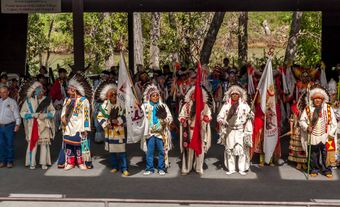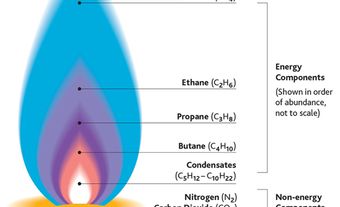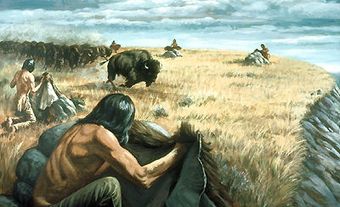Medicine Hat, Alberta, incorporated as a city in 1906, population 63,271 (2021 census), 63,260 (2016 census). The city of Medicine Hat is one of Alberta's largest cities. It is located on the Canadian Pacific Railway main line and the Trans-Canada Highway in the southeastern corner of the province, bisected by the South Saskatchewan River. Canada's “sunniest” city, Medicine Hat averages 330 days of sunshine per year. A council of eight councillors and a mayor govern the city.
Settlement and Development
Medicine Hat is located on the traditional territory of the Siksikaitsitapi (Blackfoot Confederacy). Saamis Archaelogical Site, located in the valley of Seven Persons Creek, is a designated provincial historic site. The location was a winter campsite used by Plains Indigenous peoples prior to European colonization.
In 1883, a tent city sprang up in the valley of the South Saskatchewan River where Canadian Pacific Railway work crews were constructing a bridge. Early settlers, some Métis, others Ontario-born, were first to arrive in the area. By the 1890s, German-speaking immigrants occupied parts of the hinterland that were not previously set aside for farming and ranching. The discovery of natural gas, coal and clay deposits contributed to early industrial development. However, economic depression before and after the First World War, as well as severe drought conditions during the 1920s and 1930s, slowed economic development. During the post-war period, Medicine Hat saw a gradual restoration of economic prosperity and an increase in population.
Economy

Medicine Hat’s economy has historically been tied to two natural resources, natural gas and clay. The city’s numerous natural gas wells led to its nickname, “Gas City,” while the clay in the region supported the production of various items, including bricks. In 2019, Medicine Hat announced a plan to close about 2,000 of its natural gas wells due to dropping natural gas prices. While oil and natural gas industries may be declining, manufacturing continues to be an important part of Medicine Hat’s economy. For example, the city is home to a Goodyear tire plant and a methanol plant. Canada’s largest Bitcoin mine is also located in Medicine Hat. Medicine Hat is also the closest city to the Suffield military base, the largest military training area in Canada.
Cultural Life
Medicine Hat has several parks and recreational facilities. The Cypress Hills, a favourite recreation area for residents, is located 66 km southeast of the city.
Medicine Hat college offers post-secondary educational opportunities. The Medicine Hat Mavericks are part of the Western Canadian Baseball League and the Medicine Hat Tigers are part of the Western Hockey League. The city takes pride in a number of visual artists who have won recognition for their work nationally. Area residents are served by a daily newspaper, Medicine Hat News.

 Share on Facebook
Share on Facebook Share on X
Share on X Share by Email
Share by Email Share on Google Classroom
Share on Google Classroom



